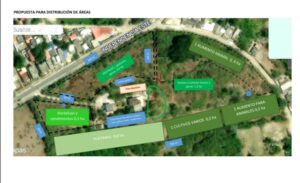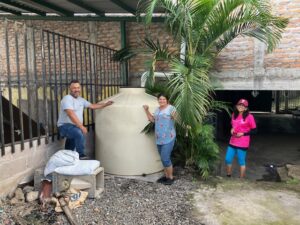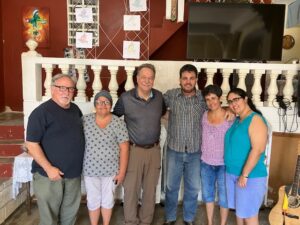
“One doesn’t expect out of life what one has already learned it cannot give, but rather one begins to see more and more clearly that life is only a kind of sowing, and the harvest is not here.”
Vincent Van Gogh
Ps. 125:5-6 “Those who go out weeping bearing the seed for sowing shall come home with shouts of joy carrying their sheaves.”
These were the refrains running through Dwight’s mind as he was in Honduras and Cuba in October and November, working with the communities where we have supported rainwater harvesting projects.
The Water for All Project, with RECONPAZ (Continental Christian Network for Peace) is planting seeds.
Rainwater harvesting is an idea, a simple technology, that when cultivated and adapted to the local context, is restoring dignity, and people’s ownership of their own water system.
And yes, joy comes when people can “drink water from their own cistern,” one of the biblical visions of Shalom.
Honduras
Helen Gutierrez is not officially the “coordinator” of RECONPAZ Honduras, but she is the catalyzer, a friend and pastor to the communities we are working with. She is an example of leading participatory development.
Dwight received a donation for more rainwater systems in Honduras, which in itself would have been sufficient for one installation. Helen asked four communities to contribute for the costs of materials beyond the tanks that we would provide. We were able to create four projects instead of just one, and the community feels like more than just the beneficiaries. All the projects are in partnerships with a local church, or Christian womens’ groups.
Just planting seeds, the list could go on.
Why introduce rainwater harvesting?
The reflection below explains exactly the situation that so many of the regions and communities where we serve are facing.
It came this week in an e-mail from the Seven Weeks for Water 2024 series of the WCC Ecumenical Water Network, written by Rev. Vinod Victor, Anglican Church of Freiburg in Germany.
“How can we drink from our own cisterns?
When we are alienated from our own lands and cisterns by forced migration;
When the invader brutally takes control of all our water sources and prevents access to them;
When, in the name of caste and identity, we are denied access to our own water;
When, in the name of privatization, fences and walls are built around our water sources;
When in the search for profit, the right of “the generations yet to be,” for access to water is forgotten;
When, in the name of development, our hills and forests are destroyed, and the springs and sources of our water are taken away forever;
When, intentionally, water is sold with a price and made inaccessible and unaffordable;
When people in several parts of the world begin to ask—what does safe water look like?”
Rainwater harvesting, in partnership with local communities, is a way of seeking the kingdom of God, where surely everyone can “drink from their own cisterns.”
Cuba
In November I was in Cuba for an extended time, delighted that Steve Van Ostran, Executive Ministries of ABC-Rocky Mountains could accompany me and get to know the experiences of the churches in the Fraternidad de Iglesias Bautistas de Cuba (FIBAC).
We are collaborating on rainwater harvesting projects, with leaders of FIBAC, Waldemar Murguido and his wife, Arianny, and Tony Santana.
Before that, we visited many churches. Two remarkable things about them stood out.
Women pastor more than half of their churches.
And they all emphasized that a key part of their mission is creation care. Mostly they are starting with backyard and community gardens.
The first rainwater project is at a church camp not far from Havana. The water will be used for the already extensive gardens and livestock, and as a teaching example for the neighbors that come by.
The 5+ acre site is also being re-purposed as a working permaculture farm, to serve for income, and for demonstrations to the community. This is a worthy project I want to support.
So, maybe Van Gogh was only half-right. We get glimpses now and then, foretastes, of that final harvest, when people take hold of the vision that God’s mission surely includes the care and health of all creation (2 Cor. 5:19; Eph. 1:9-10).




